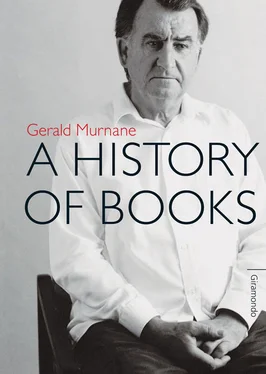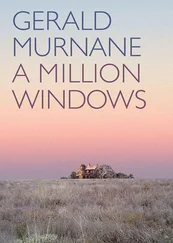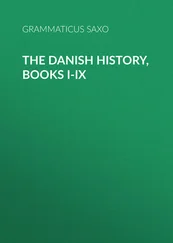I never met any of the leading settlers from Outlands. There seemed to have been two men prominent in the founding of the settlement: one a medical practitioner and the other a barrister and solicitor. Of these two, the legal man was much more often talked about at the Farm, and always with reverence. His surname ended with the fifteenth letter of the English alphabet. So, too, did the surname of the Reformed Gambler. (And, so too, of course, did Nunkie’s surname.) I understood that the Reformed Gambler had come to Australia from Italy as a young man. I concluded from all this — wrongly, as I shall explain later — that the surname of the admired legal man was an Italian surname.
The founder of Grasslands would have said at the time that he had founded his settlement as a place where he and his like-minded followers could live prayerful lives far from the dangers of the modern world. Or, he might have said that Grasslands was intended as a place from which heaven would be more readily visible.
If the founder of Grasslands had been asked at the time what were the chief dangers of the modern world, he would have described in detail two images that were often in his mind. The first image was of a map he had seen a year or so previously in a Melbourne newspaper as an illustration to a feature article about the damage that would be caused if an Unfriendly Power were to drop an atomic bomb on the central business district of Melbourne. Certain black-and-white markings in the diagram made it clear that all persons and buildings in the city and the nearest suburbs would be turned to ash or rubble. Certain other markings made it clear that most persons in the outer suburbs and the nearer country districts would later die or suffer serious illness. And other markings again made it clear that even persons in country districts rather distant from Melbourne might become ill or die if the wind happened to blow in their direction. Only the persons in remote country districts would be safe.
The second of the two images mentioned above was an image that often occurred in the mind of the founder of Grasslands although it was not a copy of any image he had seen in the place he called the real world. This image was of one or another suburb of Melbourne on a dark evening. At the centre of the dark suburb was a row of bright lights from the shop windows and illuminated signs of the main shopping street of the suburb. Among the brightest of these lights were those of the one or more picture theatres in the main street. Details of the image became magnified so that the viewer of the image saw first the brightly lit picture theatre with a crowd milling in the foyer before the beginning of one or another film and next the posters on the wall of the foyer advertising the film about to be shown and after that the woman who was the female star of the film and finally the neckline of the low-cut dress worn by that woman. This image was sometimes able to be multiplied many times in the mind of the viewer, who would then see images of darkened suburb after darkened suburb and in those suburbs picture theatre after picture theatre with poster after poster of woman after woman with dress after dress resting low down on breasts after breasts.
If the founder of Grasslands had been asked at the time why he had founded his settlement, and if he had been able to describe in detail to his questioner the images mentioned above, he would have assumed that the questioner would not need to question him further and would understand that he, the founder of Grasslands, wanted to live in a place where he need no longer fear the bombs of an Unfriendly Power and need no longer try to imagine the details concealed by low-cut necklines of dresses of female film stars.
One of the young men who called at the Farm from Outlands wore a beard. Until I met him, I had never seen a beard on any but an aged man. I watched the bearded man while he worked with rolled-up sleeves to load some timber from a disused Farm building onto a truck that was going to Outlands. The bearded man joked and said such things as gave me to understand that he read often from the New Testament and the Fathers of the Church and Saint Thomas Aquinas. I thought of the bearded man as resembling a man from medieval times, and I supposed Outlands more resembled medieval Europe than modern Australia.
The newspaper carried by the pale and plumpish young man mentioned much earlier in this piece of fiction was in the Spanish language. Even before I stayed at the Farm, I had come to understand that Spain was the most admirable of all European countries, even though it was the most reviled by the secular press. It was the most admirable, so one of my father’s sisters had once told me, because it was the only country in Europe where Communism had been fought to a standstill, and it was the most reviled because many journalists secretly sympathised with Communism.
Many years after both Outlands and Grasslands had ceased to exist, I read a statement by a man who had been a commentator on current affairs in various Catholic newspapers and on a Catholic radio program from the 1930s to the 1950s. The man had stated that he had taken many unpopular positions during his career as a commentator and had received many angry letters as a result but that the most numerous and the angriest letters by far had been those that reached him after he had written and had broadcast his opinion that the government of General Franco better suited the interests of Spain than any government that might have been installed if the Civil War had ended differently.
The founder of Grasslands knew nothing of the causes or results of the Spanish Civil War, but he sensed that in this connection, as in so many others, the sort of Catholic who wore a beard and chose to live on a remote settlement possessed an inner, private knowledge of moral issues which was almost the opposite of what passed for knowledge with other persons. The founder hung about the pale and plumpish young man while he read parts of his newspaper. He, the founder, asked to have the dialogue in the Felix the Cat cartoon translated for him and laughed at the humour of it and learned from it the only five Spanish words he was ever to learn. The same founder was not at all troubled when the same pale and plumpish young man returned to the Farm two weeks later for another short visit and took out the same edition of the same newspaper (the founder identified it from the Felix cartoon) and began to read parts of it.
When the liturgical season of Advent was about to begin in the world where the settlement of Grasslands appeared as a few rows of cracked mud blocks and its settlers as a dozen and more forked twigs, the uncle of the founder of Grasslands, in whose eyes the settlement was a thriving village whose residents sometimes angered their neighbours by speaking the Spanish language instead of the English, took his nephew and the nephew’s cousin into the garden of the Farm in order to choose leaves for the weaving of an Advent wreath, which was a custom, so the uncle said, that European Catholics had kept up since the Middle Ages and earlier. They chose fig leaves for the wreath, wove the wreath, and hung it in the main room of the Farm. For a few days, the wreath looked well: a mass of green leaves hanging like a halo above the dining table. On each of those days, the residents of the Farm had gathered at evening and had prayed beneath the wreath and had sung an Advent hymn some of the words of which can be found in a book of fiction that I wrote nearly twenty years ago.
Ten minutes ago, I took down from the bookshelves in this room a copy of the book of fiction mentioned in the previous sentence. I had not looked into that book for several years, although I see in my mind every day one or another of the images that caused me to begin to write the book, the title of which is Inland . I learned from my looking into the book Inland just now that the narrator of the book did not report that a certain wreath of fig leaves mentioned in the book had become brown and withered soon after the wreath had been hung in the living room of a certain house. I learned also just now that the narrator of Inland , which is a book of fiction in the same way that this piece is a piece of fiction, had reported in the book that a certain utopian settlement founded by certain characters in the fiction was situated between two rivers the names of which are identical to the names of two rivers on the maps of Victoria in the collection of maps in this room.
Читать дальше












